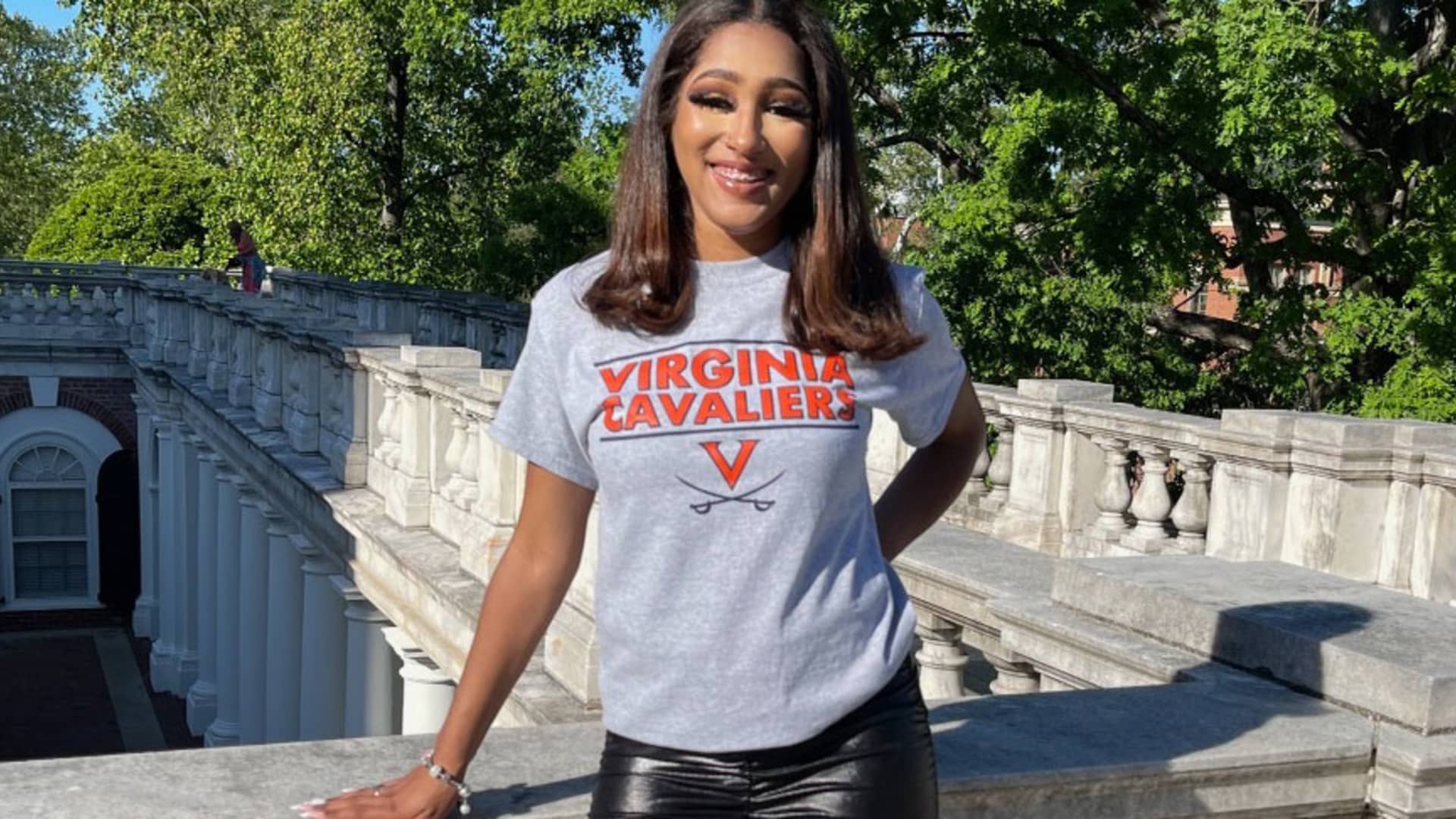
It's the question almost every college student or college graduate dreads to think about: How do I pay off my student loans?
On top of having to pay for food, gas, rent and other assorted bills, now, along with your fancy new degree when you graduate, comes a boatload of student loan debt.
Grant Pepin, a junior at George Mason University majoring in business with a concentration in marketing, admitted that the thought of paying off all his student loans after graduation scares him.
"I keep seeing the number racking up. I check it neurotically because I do like to keep my numbers straight. And well, it just keeps building, and it just seems like an indomitable amount," he said.
Get Connecticut local news, weather forecasts and entertainment stories to your inbox. Sign up for NBC Connecticut newsletters.
Pepin, who has taken out student loans for every semester since his freshman year, said he will be looking at about $90,000 or more of student loan debt by the time he graduates. "I'm thinking it'll take me until I'm well past 30 to completely pay off all those loans," he said.
The average student loan debt is $37,000 for borrowers with federal loans, according to the U.S. Department of Education. And many, like Pepin, have anxiety about paying that off. About 62% of adults in the U.S. with federal student loans say their debt negatively affects their mental health, according to the CNBC + Acorns Invest In You Student Loan Survey conducted by Momentive.
One of the biggest factors when it comes to stress and anxiety is the unknown. Student loan debt can wind up feeling like a big cloud hanging over your head. So, there are two important things you need to do to help get beyond that feeling: 1) Know what you owe (the total, when the first payment is due and how much each payment will be) and 2) Make a plan to pay it off.
Money Report
Winnie Sun, co-founder and managing director of California-based Sun Group Wealth Partners, suggests that students start making a plan as "soon as possible" while in college. It's best, she says, not to wait for that first bill to show up.
"Set aside money every time you get some extra cash. If you're working, take a little bit, just one or two percent or five bucks," said Lauryn Williams, a four-time Olympian and founder of the financial advice firm Worth Winning. "If you get money from allowance or even when you go home on a holiday break, take some of it and put it into a savings account for your student loans."
More from College Voices:
Tips for college students: How to rent your first apartment
Are you doing your job search right? How to land your first job after graduation
Setting up a budget right out of college is easy—and smart
Pepin said he is saving money any way he can while still in college. "I am putting a cap on any spending I do for the year, and I keep expanding that cap year by year," he said.
A lot of college students don't think about their loans while they're still in college — and then some regret it after they graduate.
"I honestly did not save for my loans while in college. I did not have to take any loans out until my third year of college due to personal circumstances and Covid," said Holly Battist, a class of 2022 graduate from the University of Virginia who now has to repay $12,000 in student loan debt. "I wish I would've set money aside. Despite being in a full-time job now, the money isn't stretching as long as I would like … It's really hard because I am independent and didn't acquire knowledge about compensation — taxes (both state and federal), insurance plans, etc., that affect your take-home amount."

This is all too common — unexpected expenses or situations come up and if you don't have emergency savings, you wind up going into debt. But, if you're in the same boat — don't worry! Take heed, work to start paying off your debt and build an emergency cushion.
Here are a few things to keep in mind when you're paying back your loans:
Use the six-month grace period wisely
For most federal loans, there will be a sixth-month grace period before you have to officially start making loan payments.
It is important that you use this time wisely. This grace period is given to allow college graduates time to get settled after graduation, find a job and save money. It also gives them time to determine which repayment plan they would like to be on.
Battist, who is currently in her grace period, just started her first post-graduation job at True Search as an executive search analyst.
Getting that first job is key, but now Battist must focus on managing her money and paying down that debt.
"I am trying to look at my first paycheck and work loan payments into my budget," she said.
Battist recommends that recent graduates start saving money while in their grace period in order to be in a better position to pay back those loans.
"Minimize your spending if necessary — the brunch dates and happy hours can wait," Battist said. "I would just say you have to get a new perspective — especially if you're a minority like myself — because many of us are still in debt like my mother and it's been years since she left school. You really have to set yourself up for success and … a big future."
Of course, that's not to say have no fun. But, it means don't be tempted to blow your paycheck on extras just because you're making a regular salary now. Take your responsibilities seriously and keep your spending in check. Maybe limit the amount of money you spend out on food and drinks and instead plan a few gatherings at home with friends. Those can be just as fun — and cost a lot less.
Williams of Worth Winning suggests dedicating at least 15% of your take-home pay to debt repayment, paying off the highest interest debt first.
It's also important to remember that interest accrues on loans during the grace period. If you do pay the interest during your grace period that can prevent it from being added to the principal balance, according to budgeting tips on the Federal Student Aid website.
Create a plan
The first thing you want to calculate is exactly how much you owe on your student loans.
- To find out how much you owe in federal student loans, go to the Federal Student Aid website.
- You can find out how much you owe in private student loans in one of three ways, according to advice from Student Loan Hero: 1) Go to the original lender(s) and ask how much you owe, 2) Ask your student aid office, or 3) Check your credit report.
There are several repayment plan options for your federal loans. According to the Federal Student Aid website, here are a few of the different types of plans you can choose from:
1. On a Standard Repayment Plan, your payments are a fixed amount that ensures your loans are paid off within 10 years.
2. On a Graduated Repayment Plan, your payments are lower at first and then increase, generally every two years, and are for an amount that will ensure your loans are paid off within 10 years.
3. With an Extended Repayment Plan, your payments may be fixed or graduated, and will ensure that your loans are paid off within 25 years.
4. On a Revised Pay As You Earn Repayment Plan (REPAYE), your monthly payments will be 10% of discretionary income. Payments are recalculated each year and are based on your updated income and family size.
There are several other variations on this income-based plan you can see the full list of plans on the Federal Student Aid website.
When choosing your repayment plan, be sure to choose one that works with how much money you are making.
"If you owe more than you earn, you're going to want to try to use the income-driven plan," said Williams.
"If you get out of school and you owe $50,000 and your first job is $30,000, it's going to be hard to make ends meet, make your student loan payments and be really aggressive with the loan. That's when it's OK to use the income-driven plan," Williams said.
Battist said she will probably choose the pay as you earn repayment plan. She said that once she gets that first paycheck from her new job, she will immediately start figuring out how much she wants to pay each month.
Experts recommend creating a spreadsheet for your student loans.
"Start with a simple spreadsheet — it could be on a Google spreadsheet or Excel — and just lay out what the loans will look like, how much you owe and what the interest rates will be," Sun said.
Make another spreadsheet for your budget with one section detailing all your sources of income and figuring out the total, and another for all of your spending on necessities like rent, utilities, auto payments, groceries, debt like your student loans and your nonessential spending like eating out or buying new clothes. You can create this yourself or search online for "college student budget template" or "college graduate budget template."
After figuring out your budget, it is smart to go back and check to see if there are some areas you can improve. This way, Sun said, you are taking a "mental note" of what you should and shouldn't be spending money on, in order to set aside the right amount of money for those loan payments.
Battist said she will try to set aside money from her budget weekly. One easy area Battist says she can cut back is on ordering food from restaurants and just eat at home instead.
Making the monthly loan payments
Every month, you will be making your student loan payments to your loan servicer(s), which are the companies that handle the billing and other services on your loans.
You should already know who they all are but if you don't have their websites/contact information all together, make a list or put that in your student loan spreadsheet. Contact each of them and know exactly how much you owe, what payment is due and when it is due.
Sun of Sun Group Wealth Partners suggests doing auto-pay on your loans to have the amount automatically deducted from your checking or savings account each month. Not only will that ensure you pay them on time, but in some cases you can get a discount on your interest rate with auto-pay. For example, if you have a federal Direct Loan, you can get a discount of 0.25% on your interest rate for setting it up on auto-pay, according to the Federal Student Aid site.
How can I pay off my loans fast?
Many graduates want to pay off their student loans as fast as possible. Battist said she would like to have hers completely paid off within the next six years. "I would love to pay this off within the shortest time possible to minimize the interest rates," she said.
If you want to be aggressive with paying off your loans, Williams suggests you try to refinance your loans and get a cheaper interest rate, if possible. "That way you save yourself some money on interest, and it can bring your monthly payment down as well." Williams also suggests that any time you get extra money, put it toward a student loan payment. "If you get a bonus, a tax refund, or you get money from family, a friend or for a holiday, take all those extra dollars and throw them at the loan."
Another option that Williams and Sun both suggest if you really want to pay off your loans in three to five years, is to pick up a side hustle. It can be driving an Uber or Lyft, doing freelance projects or really anything that can make you some extra cash alongside the money from your full-time job, that can go toward the loan payments.
"While three years sounds like a really long time, if you're, let's say, 21 graduating college and at 24 you're student loan debt-free, from three years of sacrifice, you've got a whole life ahead of you," Williams said.
What if I'm unable to make a payment?
Say it's six months after the grace period, and you still don't have a job. Or maybe you do have a job, but your necessary day-to-day living expenses are piling up. What on earth do you do if you can't make a payment on time? The worst thing you can do is miss a deadline, the experts say. Williams suggests that you should immediately call your loan servicer and let them know of your current income situation. Be sure to ask your loan servicer about changing your repayment plan. It's important that you know it is OK to ask for help.
While the loan servicer will help you adjust your repayment plan based on your financial situation, you can't just rely on that. Because at the end of the day, you still have to eventually make these payments. It is important that you also are looking for ways to make sure this doesn't happen again.
You may need to go back to that budget and start looking at how you can cut back on your spending expenses. Or come up with ways to bring in extra income. Do whatever you can to make these monthly loan payments on time, because if you don't there are consequences.
If you are a few days late on a payment, your loans will become delinquent and will remain delinquent until you pay off the due balance.
If you are 30 days late, your loan servicer will charge you a late fee — and that could be up to 6% of your late payment amount.
However, if your payment is 90 days overdue, your loan servicer will report the delinquency to the main credit bureaus, which could significantly affect your credit. And let's be honest, you do not want to have bad credit on top of trying to pay off your student loans.
Even worse, if your payment goes 270 days overdue, the loan goes into default. In this instance, the government can move to garnish such income as paychecks, Social Security checks, federal tax refunds and disability benefits.
What if I'm going to grad school?
For students who are going straight from undergrad to graduate school, and taking out loans for grad school, too, you have two options:
1) While you're in school, your loans will be in what's called student deferment. That means you have the option, while you're in grad school, to defer those undergraduates loans and wait to start paying them off after you're done with grad school.
2) You can also choose to waive that deferment while you're in school and start tackling that debt as soon as possible.
"You can start paying on those undergraduate loans while you're getting your graduate degree and be on a payment plan and be rocking and rolling," Williams said.
Don't bank on student loan forgiveness
With the talk of student loans forgiveness and debt cancelation in the air, you might be tempted to say — oh, I don't have to worry about my debt!
That's not a wise approach.
Broad student loan forgiveness hasn't happened yet and there is no guarantee that it will. So be true to that plan you have to pay back everything you owe and just consider it a bonus if student loan forgiveness happens.
At the moment, there are some groups that qualify for student loan forgiveness, including those employed by a government or nonprofit organization, teachers who work at low-income schools and students attending a school that closes while they are enrolled or soon after they withdraw. For terms and other information about student loan forgiveness, go to the Federal Student Aid website.
Pepin, the George Mason junior, said that he does not expect President Biden to cancel student loans for everyone by the time he graduates. "I'm not very confident it's going to happen. I'm just preparing for the worst."
Student loans can be scary — it's natural to worry about a large amount of debt. But just remember: You are not alone. There are others in the exact same position as you — and there are resources to help. Don't get overwhelmed by the total amount of debt you owe. Just make a plan and start chipping away at it.
Just tackle it "brick by brick," Sun said.
The more you see it go down, the less stressed you will be!
″College Voices″ is a guide written by college students to help young people learn about important money issues such as student loans, budgeting and getting their first apartment. Jaala Brown is a talent development intern at CNBC for the summer of 2022. She is senior at George Mason University majoring in communications with a double concentration in journalism and public relations. The guide is edited by Cindy Perman.
SIGN UP: Money 101 is an 8-week learning course to financial freedom, delivered weekly to your inbox. For the Spanish version Dinero 101, click here.
CHECK OUT: I went from making $15 an hour to a net worth of $275,000 in 6 years: Here's how with Acorns+CNBC
Disclosure: NBCUniversal and Comcast Ventures are investors in Acorns.






